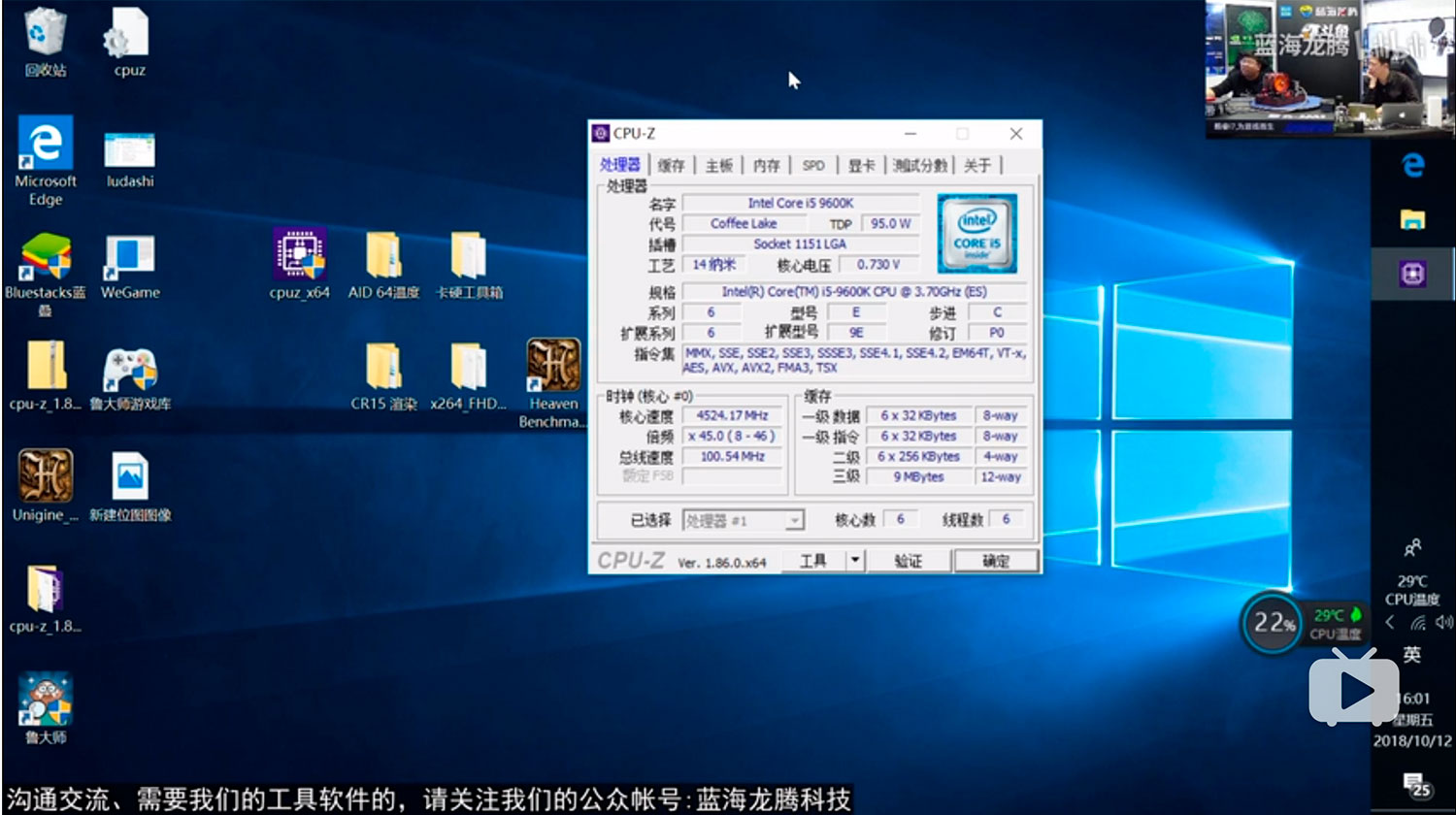Intel Core i5-9600K Stock and 5.1GHz Overclock Benchmarks Leaked
Chinese outfit 蓝海龙腾 (loosely translates to Blue Sea Dragon) has uploaded a 34-minute video to popular Chinese video sharing platform Bilibili that reportedly shows off the forthcoming Intel Core i5-9600K's stock and 5.1GHz overclocked performance.
Intel unveiled its 9th Generation Intel Core processors last Monday. While Z390 motherboards have already gone up for purchase at U.S. retailers, the 9000-series processors are still on pre-order and won't be released until October 19.
The latest leak gives us a small taste of what we can expect from the Intel Core i5-9600K hexa-core processor in terms of performance gains over the previous model that it's replacing, the Intel Core i5-8600K. Blue Sea Dragon paired its Core i5-9600K ES (engineering sample) chip with an MSI MEG Z390 Godlike motherboard and a 16GB Adata DDR4-2666 memory kit with CL19-19-19-43 timings. The Thermalright Silver Arrow Extreme air cooler took care of the processor's cooling, while an MSI GeForce GTX 1050 Ti was responsible for graphics duty.
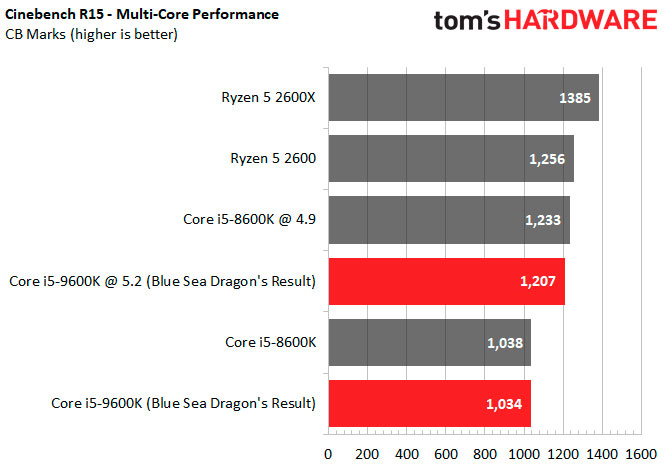
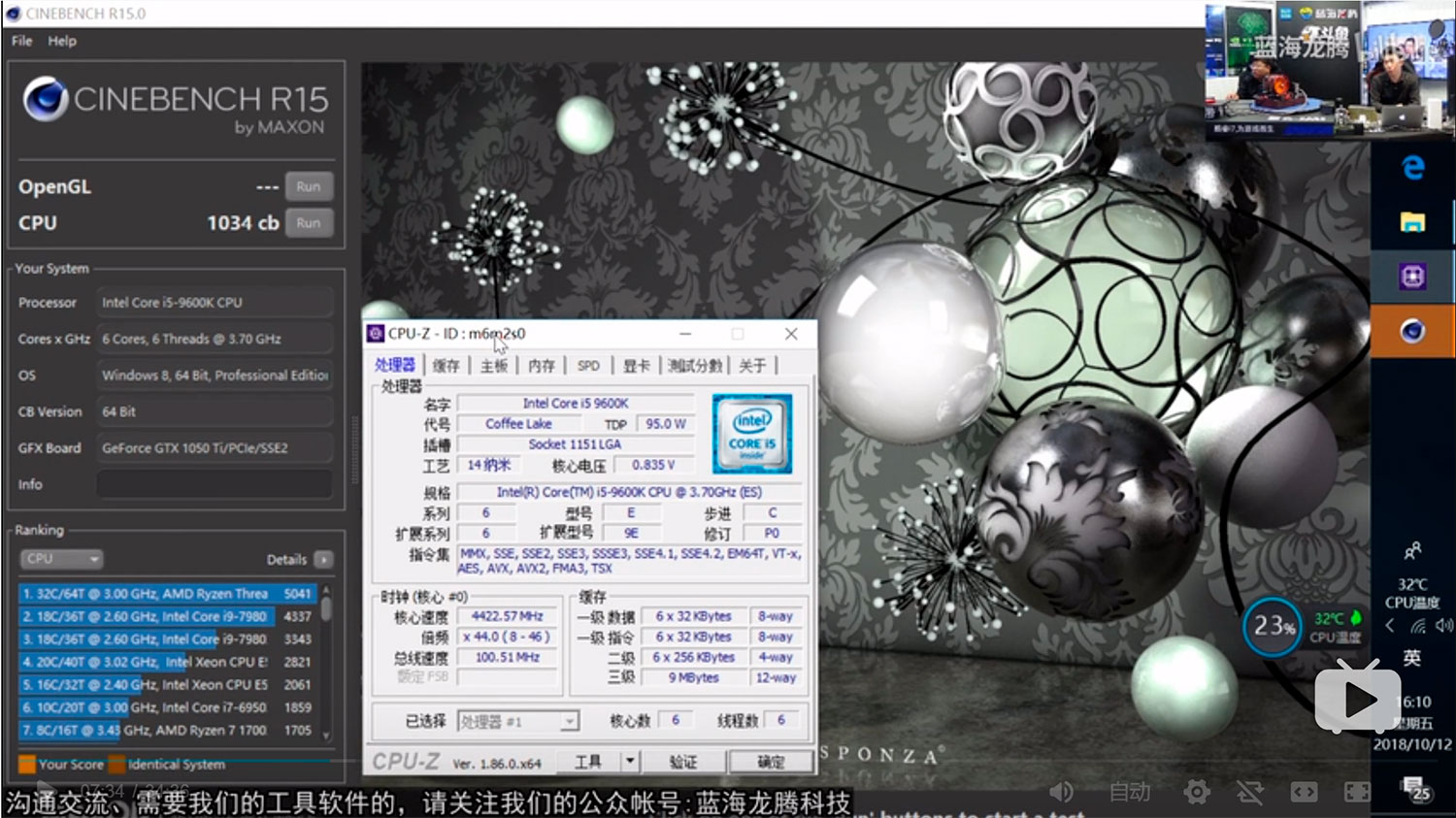
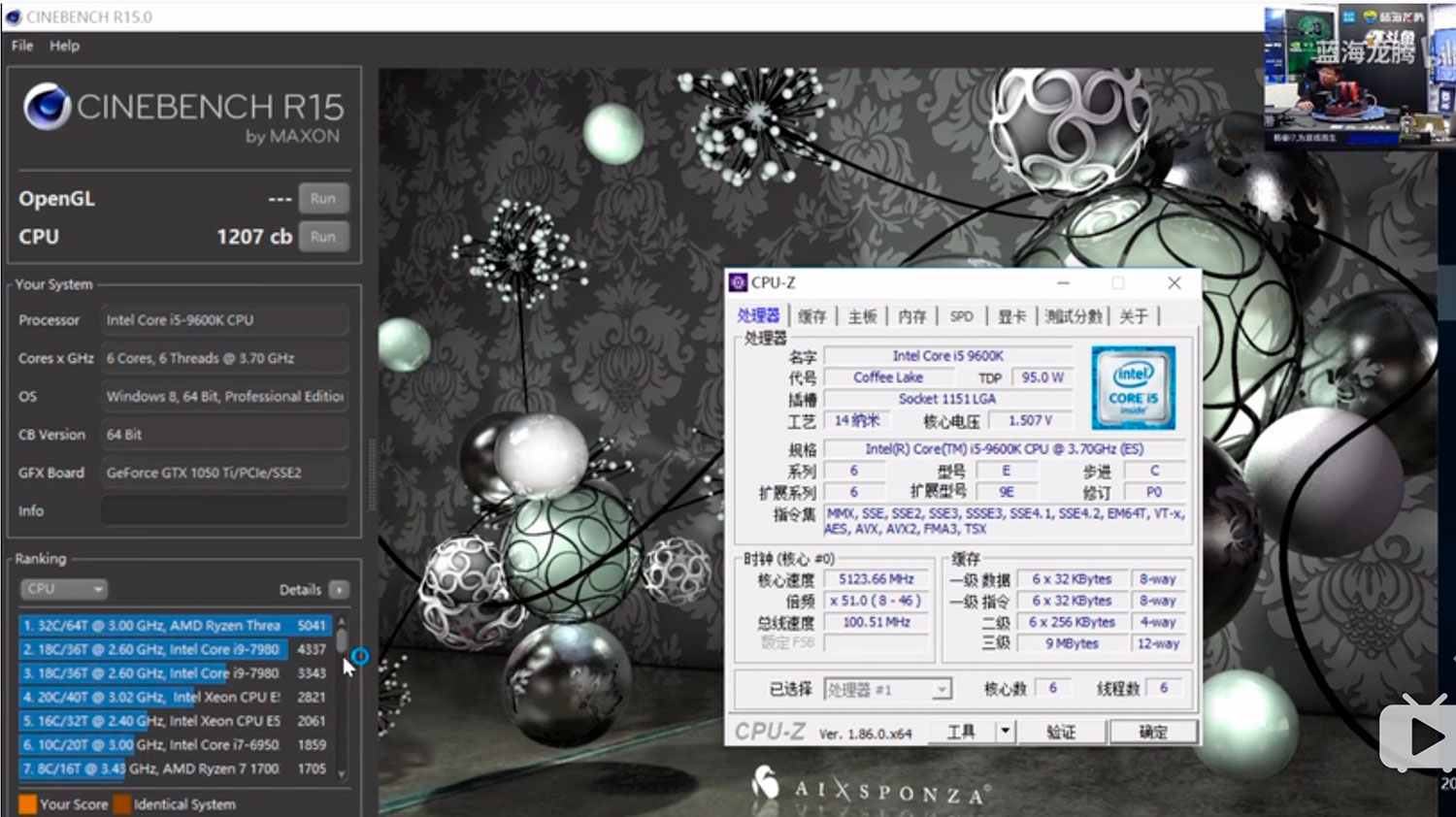
Blue Sea Dragon's choice of benchmarks is a lot different from the suite used at Tom's Hardware, so it's hard to make a fair comparison between the Core i5-9600K and our previously recorded benchmark results for the Core i5-8600K. However, we do use the Cinebench R15 benchmark, and Blue Sea Dragon's Core i5-9600K results were surprisingly lower than our Core i5-8600K results. Note, our test platform is similar to theirs. We used a MSI Z370 Gaming Pro Carbon AC motherboard and a 16GB G.Skill FlareX DDR4 memory kit clocked at 2,666MHz for our i5-8600K testing.
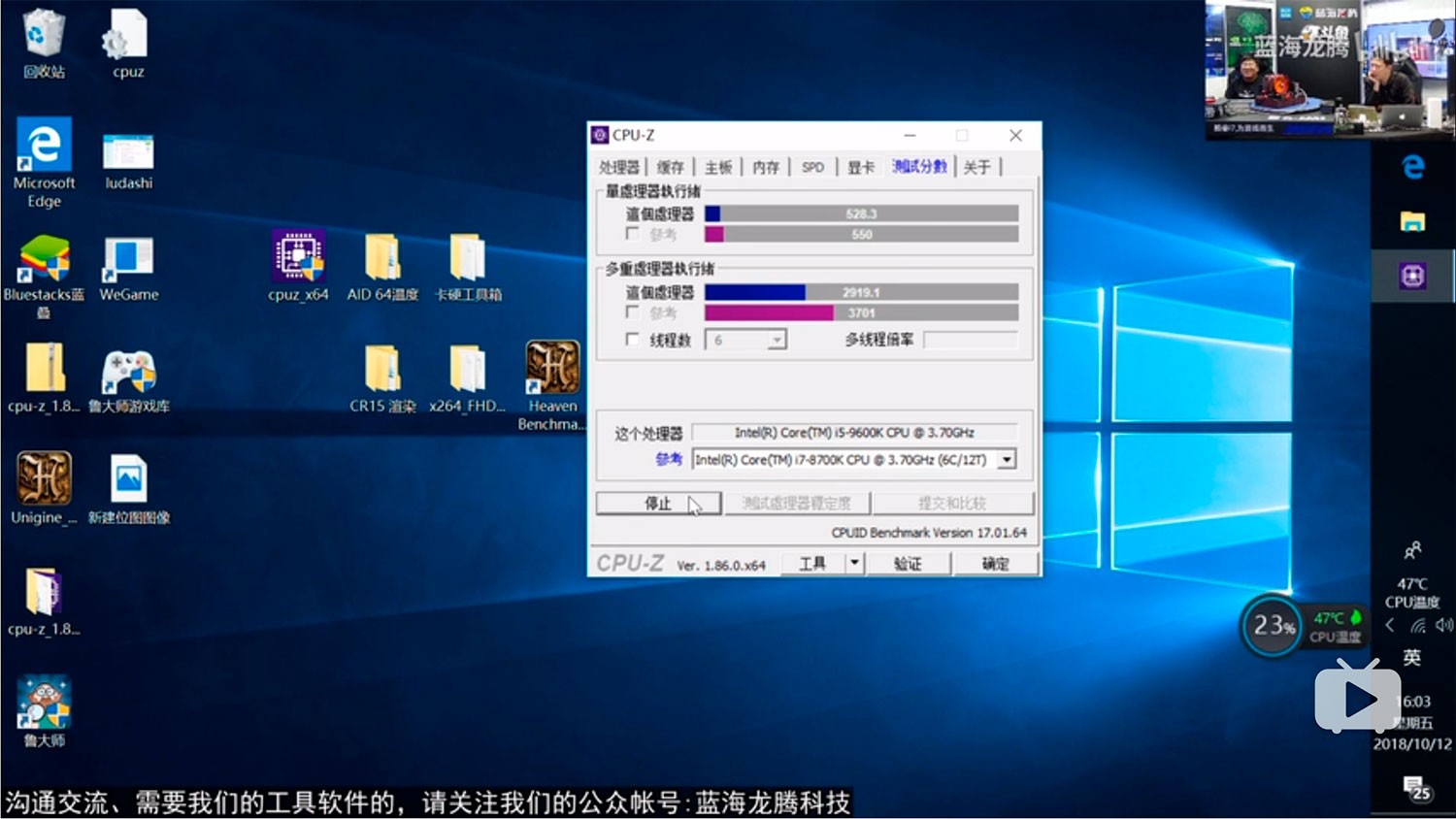
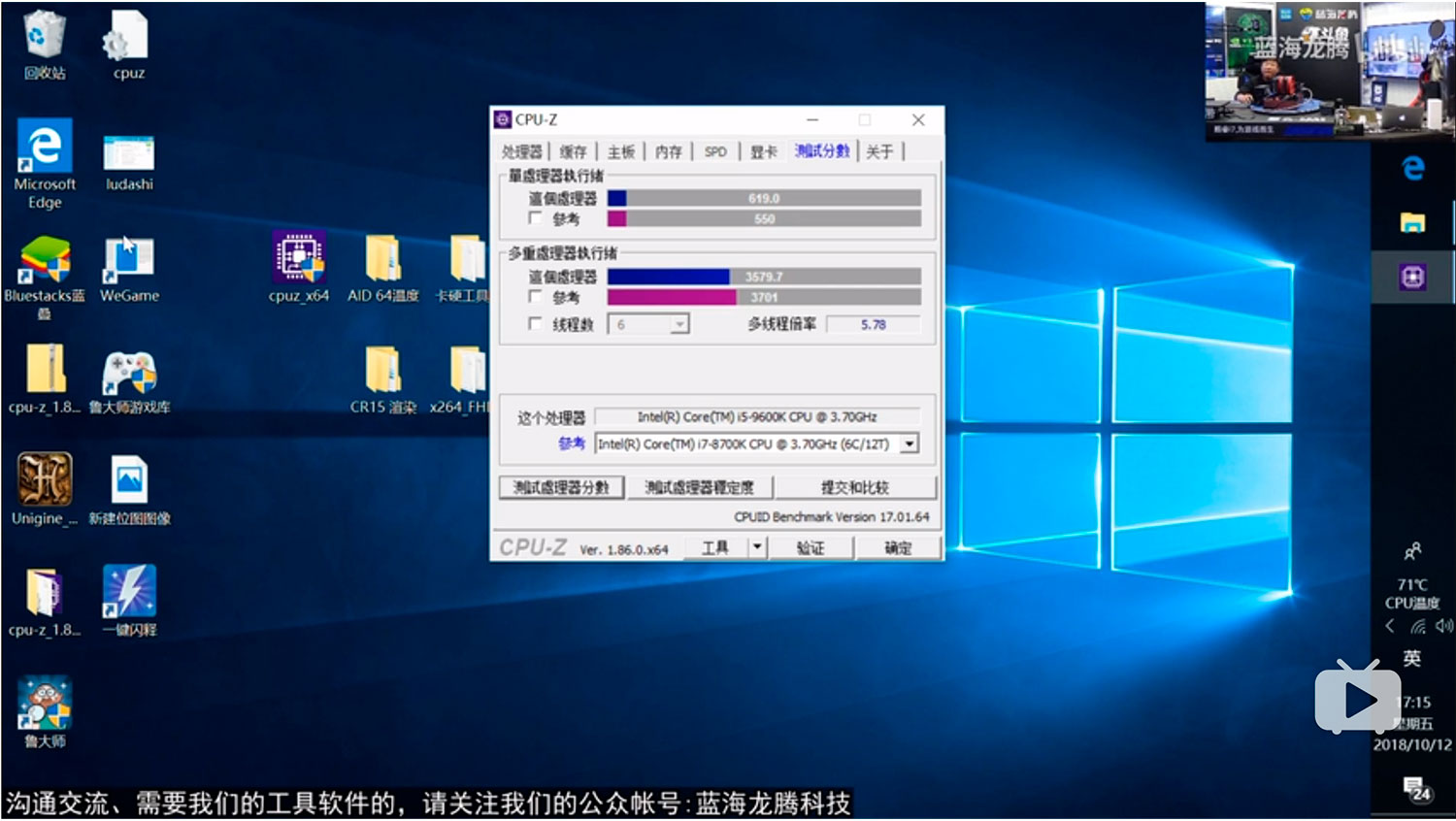
Blue Sea Dragon also ran CPU-Z's built-in benchmark. Unfortunately, the Core i5-8600K model wasn't available as an option for comparison. So, Blue Sea Dragon pitched the Core i5-9600K against a Core i7-8700K instead. According to the results, a stock Core i5-9600K is only 4.1 percent and 26.8 percent slower than a stock Core i7-8700K in single-threaded and multi-threaded scenarios, respectively. With the chip overclocked to a little over 5.1GHz with 1.507V, the Core i5-9600K beat the Core i7-8700K by 12.6 percent in the single-thread test, while reducing the multi-thread performance gap from 26.8 percent to 3.4 percent.
Get Tom's Hardware's best news and in-depth reviews, straight to your inbox.

Zhiye Liu is a news editor, memory reviewer, and SSD tester at Tom’s Hardware. Although he loves everything that’s hardware, he has a soft spot for CPUs, GPUs, and RAM.
-
redgarl Well, removing the hyperthreading has its impacts. I am sure they did that to mitigate Meltdown and Spectre issues.Reply -
TJ Hooker Reply
It's an i5 though, they never had hyperthreading in the first place.21403587 said:Well, removing the hyperthreading has its impacts. I am sure they did that to mitigate Meltdown and Spectre issues. -
mlee 2500 At first this seemed about right for a part that which doesn't have hyperthreading, like its predecessor...but then I investigated and it turns out the old i5 didn't have hyperthreading either...so....wth?Reply
I think customers will come to regret not having hyper-threading on the i7-9700k, and Intel may also regret it if their gamble in disabling it fails to drive enough enthusiasts to the flagship, more expensive i9 processor.
Then again, we're probably years away from games that are optimized for more then 4 to 6 cores or threads anyway, so maybe only people doing serious multi-media work will care. -
dudmont In regards to real cores vs. virtual cores, real cores beat virtual cores every time. Look at I5-8600k vs I7 7700k.Reply
How much of the slight performance drop compared to I5-8600k could be because of spectre/meltdown hardware changes? -
salgado18 @MLEE 2500, I believe content creators (games, videos, streamers, artists) can use many cores today, so it will probably be a terrible choice for many people. Gamers and regular users won't see much of a difference (many only care for branding anyway), but I think it will not be as popular as the older i5s were.Reply -
volkgren I'm curious to see how the i7-9700K plays AC Odyssey. My i7-7700K sees 100% utilization often. All 8 threads are used. It's always just that one (or two) game(s) though..Reply -
compprob237 Hm, the AMD Ryzen 5 2600 sure put up a good fight. I wonder what the price premium will be to go to the i5-9600K from the $150-$160 AMD chip. Especially considering these early benchmarks suggests its performance is worse than AMD's chip.Reply -
volkgren Ryzen is only faster in multi-core workloads. The people I see who buy Intel buy it because they are gamers and it is faster, not because of branding.Reply -
mlee 2500 Reply21404046 said:In regards to real cores vs. virtual cores, real cores beat virtual cores every time. Look at I5-8600k vs I7 7700k.
How much of the slight performance drop compared to I5-8600k could be because of spectre/meltdown hardware changes?
I hope that's not the case. Not to trivialize those security deficiencies, but in a consumer product which doesn't run on multi-tenant corporate or data-center platforms, the trade off would not be worthwhile at all.
